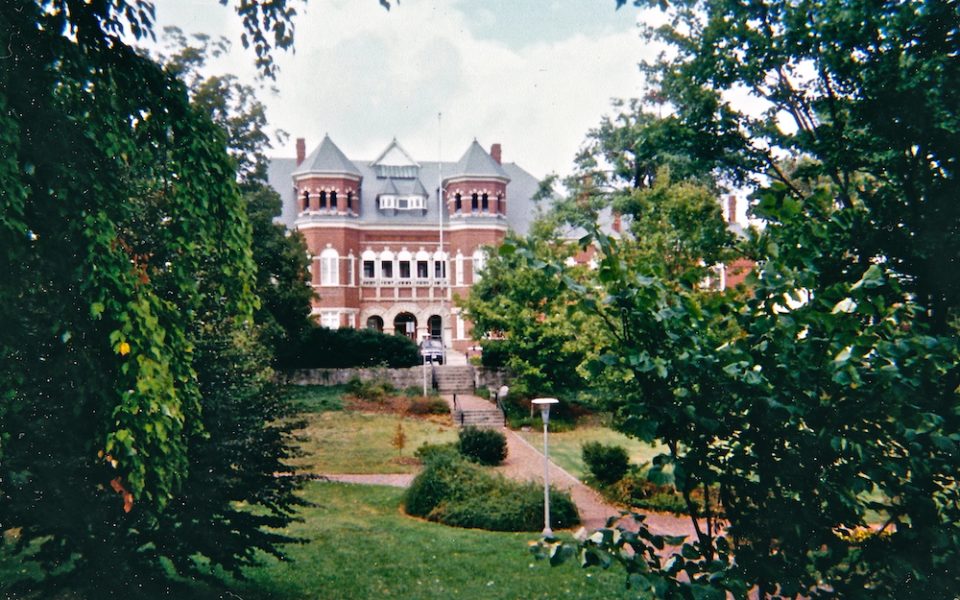As the Feb. 1 deadline looms, students and faculty members in the religious studies department at UNCG have gathered more than 3,000 signatures from around the country in support of their program.
The religious studies is one of 15 academic programs that was announced earlier this month as part of a preliminary list of programs to be cut from the university following a yearlong program review process initiated by UNCG administration.
The other programs suggested include the Bachelor’s in Anthropology, Bachelor’s of Science and Arts in Physics, foreign language courses in Chinese, Russian and Korean and the Masters in Mathematics.
In an email to Triad City Beat, UNCG junior Sophia Rosenberg said that they and others within the Religious Studies Department created two petitions to gather support for their program. The combined signatures from both petitions total 3,424 signatures as of Jan. 26.
Rosenberg, who came to UNCG in 2021, is a double major in religious studies and anthropology, both programs that were suggested to be cut.
The administration has noted that all students currently enrolled in programs that will be eliminated will be able to graduate with their respective degrees because the cutting process will take years to formalize.
Still, Rosenberg said that they “deeply love this department and the professors within it” and “believe there is no other department within the UNC system like it.”
“Religious Studies is a vital part of a fulfilling, well-rounded humanities and liberal arts education, which is what UNCG aims to provide to its students,” Rosenberg wrote. “In fact, it could not be more vital in today’s world, as it provides students with chances to understand how people all over the world live, find meaning, practice, and interpret the world in their respective religious traditions. The fact that UNCG is the only public university in Greensboro with a Religious Studies Department makes this especially important for the wider Greensboro and Guilford County population. An understanding of religion is essential if a community aims to promote diversity and equity amongst its members. Without Religious Studies, our knowledge regarding politics and political differences, culture, the lives and beliefs of others, health, sexuality and gender, psychology, current events, history, and above all, humanity, is incomplete.”
Many of the signatures noted in the petition echo Rosenberg’s statements. While most of those who signed on hail from NC, many expressed their support from outside the state.
Justin Ritzinger of Miami, recalled his time at UNCG and expressed how the program helped set the path for his career in religious studies.
“I am a scholar of religious studies,” Ritzinger wrote. “Aside from all of the value that the study of religion adds to students understanding of human culture and history, my advisor once described UNC-G’s department as the best bang for the buck in America. It is a gem of a department in an unlikely place. It would be a shame to waste that.”
Greensboro-resident Daniel Rhodes brought the argument for keeping the program back to local ties.
“Greensboro is a refugee resettlement area,” he wrote. “We have an extremely diverse population comprised of immigrants and refugees. UNCG is the most diverse campus in the UNC system. In Greensboro we have two Synagogues, two Mosques, four Vietnamese Buddhist Temples, a Thai Temple (Greensboro Wat) that has been here close to 50 years, a Burmese Buddhist Temple in Jamestown and Laotian Buddhist Temple. Greensboro is also home to a portion of the Underground Railroad, supported by Quakers who were the original abolitionist in this country. How are we to prepare students to enter a world where many conflicts are rooted in religious misunderstanding and their ability to to engage in meaningful interfaith dialogue without a Religious Studies program?”
As reported by TCB, the academic program review process has been met with consistent and passionate pushback from faculty, students, staff and the wider Greensboro community. On Jan. 24, the Associate Dean in College of Arts and Sciences, Charles Bolton, resigned from that position to protest the process. Bolton remains employed at UNCG as a history professor according to reporting by the News and Record.
Professor Gregory Grieve, the head of the religious studies department, expressed gratitude for the support from those within the Greensboro community and beyond in a statement to TCB.
“The outpouring of support from our students, faculty, and community fills us with gratitude,” he said. “The thought of our program’s end brings a heavy heart, yet we treasure the 52 years spent nurturing the minds of extraordinary students. The absence of the Study of Religion would leave a void at UNCG, both intellectually and ethically. We respectfully urge the Chancellor to rethink this decision. We’re open to solutions, including integrating our program into a different department or repositioning our faculty, to preserve this vital pillar of learning.”
Chancellor Frank Gilliam is set to make his decision on Feb. 1.
Read TCB‘s past reporting on the story at the links below:
- A tale of two outlooks: UNCG staff, faculty push back against administration’s budget narratives
- UNCG is working with a consulting group to cut academic programs. What lessons can be learned from other schools?
- UNCG’s College of Arts and Sciences faculty drafts resolution asking for extended timeline on program review while pushing back against process
Join the First Amendment Society, a membership that goes directly to funding TCB‘s newsroom.
We believe that reporting can save the world.
The TCB First Amendment Society recognizes the vital role of a free, unfettered press with a bundling of local experiences designed to build community, and unique engagements with our newsroom that will help you understand, and shape, local journalism’s critical role in uplifting the people in our cities.
All revenue goes directly into the newsroom as reporters’ salaries and freelance commissions.


Leave a Reply